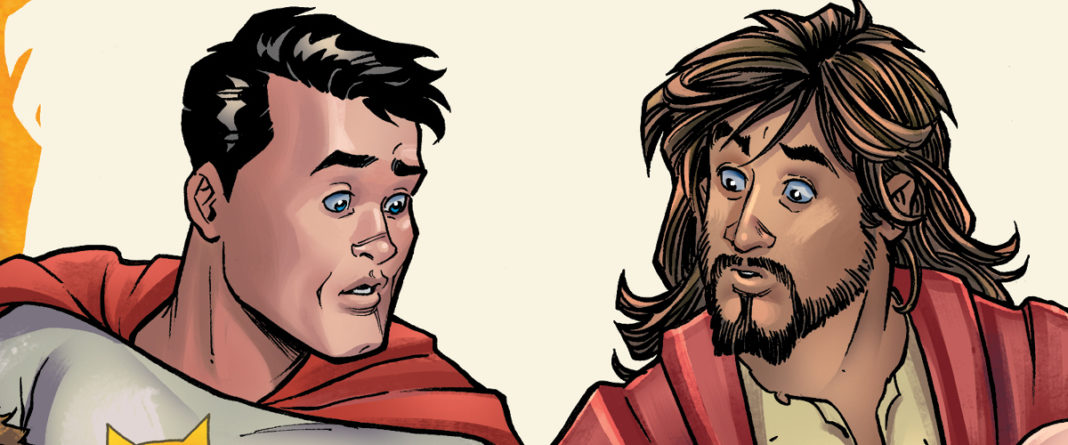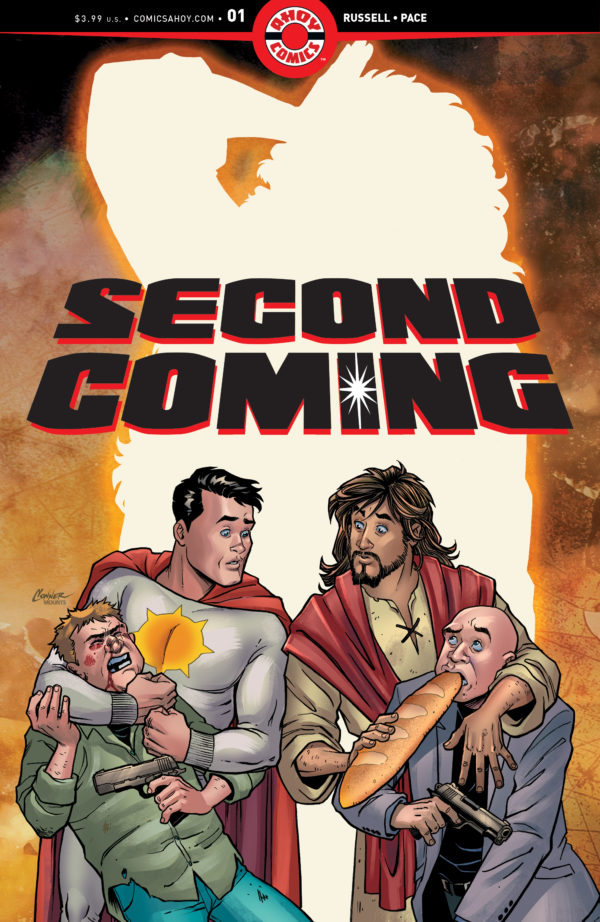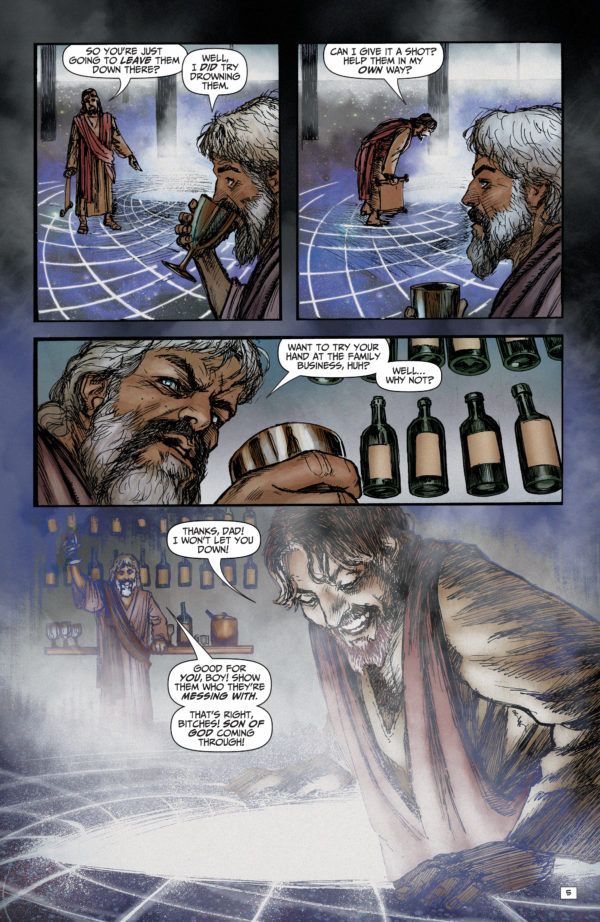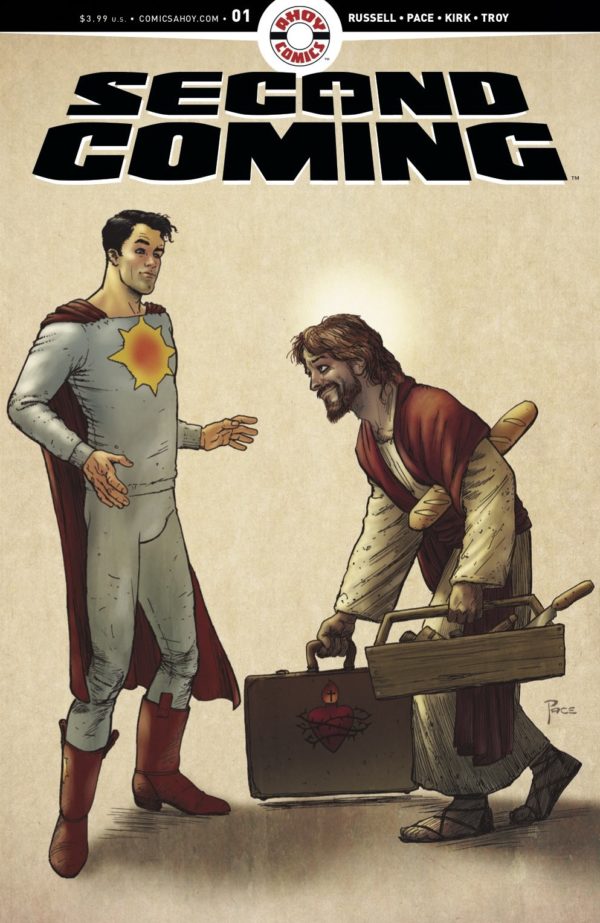Second Coming #1
Written by Mark Russell
Illustrated by Richard Pace
Cover by Amanda Conner
Art Finished by Leonard Kirk
Colored by Andy Troy
Lettered by Rob Steen
Ahoy Comics
I don’t know if it’s accurate to call Second Coming THE most anticipated comic of 2019, but I do think it safe to say it’s one of them. And if the controversy it created initially implied something dangerous, it was against a recurring history of outrage against creative works that are never as damaging as you think they are going to be. How in the world could it possibly live up to what you wanted it to be?
Two words: Mark Russell.
Russell has proven himself to be a writer who not only takes thematic challenges, but matches those efforts with an intellectual capacity to understand the themes he tackles in his comics, and then the wit to do so in the most absurd places — The Flintstones, Snagglepuss, The Wonder Twins. And so if he had written a comic about Jesus returning and hanging out with a superhero, how could it not be what you want it to be? And in doing so, how would it not be the rarest of creatures?
The nuts and bolts of the issue are that Russell tackles the entire history of the Earth through the Christian lens, from the Garden of Eden to the modern day, and through this stretch offers a lot of cutting snark that infects his portrayal of God particularly, and the story of Jesus. It’s part satire and part philosophical commentary on the state of modern Christianity, the history of its texts, and idea of religious belief in general — all of it hilarious.
But then Russell turns it into a superhero buddy comedy introducing the character of Sunstar, a sort of Supermanish character who through mystical circumstances ends up being Jesus’ mentor. There are plenty of laughs to be had at this scenario, but Russell has complete mastery of the shift and brings them together perfectly. And through the two threads — the biblical one and the superhero one — there is a consistency, and that is sweetness. Like the previous titles I mentioned earlier, Second Coming is infected by a sweetness that will literally make you gasp. Its final scene just might cause some tears.
Here’s the bottom line: I read a lot of first issues to consider them for this Indie View column. The one thing most have in common — whether it’s an issue I like and think is worth writing about or one that I don’t like and skip reviewing or one that is okay but there isn’t a lot to say about it — is that they almost always read like introductions that are setting things up for the real stuff. They typically don’t stand on their own and the best of them hint at depth to come rather than start off with the best stuff.
That’s where Second Coming veers from the norm. For a first issue, this is amazingly fully-realized. It gets to the point right away and then maintains that standard throughout. It juggles high concept with intimate characterizations perfectly. It mixes hilarity with poignancy so smoothly that they aren’t tones struggling for attention, but rather helping each other when their turn to be at the forefront comes around. The artwork by Pace does the superhero thing well, offering a nice in-between world that we can both take seriously as a world, but also recognize as completely, comically absurd, ranging from criminal robots to the sweet, toothy grin on Jesus’ face when he think he did the right thing.
The real question here is if Second Coming is everything that was feared? Is it really offensive? Yes. But it’s offensive in the same way that Monty Python’s Life of Brian was offensive, and that is by taking a narrative that some see as sacred and revealing it as nonsensical not so much with anger but with mirth — and at the same time, getting to the core of what some claim the message of the sacred narrative and putting it to the test. Does the modern interpretation live up to the pure, original version? Did any interpretation ever live up to it? Was the text ever at any point in its history ever meant to actually promote kindness? Does intention matter? Is it impossible for human beings to act kindly to other human beings, even with a sacred text directing them to? Or does the sacred text undermine the kindness, provide humans with an out while they feign adherence? And, for that matter, why do we love superheroes? Is it for the same reason our country is embracing authoritarianism and previously embraced religion, because we just want someone to tell us what to do?
That’s the real danger of Second Coming. Not the humor, the questions. It asks them, and that’s the number one thing that religions and governments and corporations and the moneyed class don’t want. It’s just that Second Coming encourages questions and, as a bonus, makes it look fun to ask them.












My twitter handle is @rpace, BTW :)
Comments are closed.